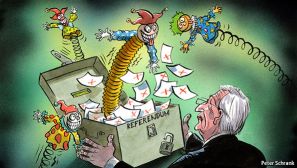B2C Ecommerce sales in the Netherlands are expected to reach 18
billion euros in 2016. The ecommerce industry was worth slightly more
than 16 billion euros last year, but according to the Ecommerce
Foundation the online retail industry is expected to increase by 12.1
percent and thus reach 18.014 billion euros.
These are some of the figures the Ecommerce Foundation shared in its latest report about B2C Ecommerce in the Netherlands. The report gives insight in the Dutch online retail industry and how it performed in 2015. According to Ginio Thuij from market research company GfK, the Dutch ecommerce sector has shown some remarkable growth last year. “Online spending increased by 16.1 percent last year, which is remarkable as it has been less than 10 percent in the preceding years.”
Cross-border sales increased by 30%: This growth was mainly due to the fact the online spending on products increased by 22 percent compared to 2014. But cross-border sales also increased significantly, by more than 30 percent. And 23 percent of the Dutch bought at least one item at a foreign website last year. In total, there were 3.2 million Dutch cross-border shoppers, spending a total of 513 million euros abroad.
For more info about the Dutch etail landscape, please visit our special page about ecommerce in the Netherlands.
Read more: Ecommerce in the Netherlands to reach €18bn in 2016
These are some of the figures the Ecommerce Foundation shared in its latest report about B2C Ecommerce in the Netherlands. The report gives insight in the Dutch online retail industry and how it performed in 2015. According to Ginio Thuij from market research company GfK, the Dutch ecommerce sector has shown some remarkable growth last year. “Online spending increased by 16.1 percent last year, which is remarkable as it has been less than 10 percent in the preceding years.”
Cross-border sales increased by 30%: This growth was mainly due to the fact the online spending on products increased by 22 percent compared to 2014. But cross-border sales also increased significantly, by more than 30 percent. And 23 percent of the Dutch bought at least one item at a foreign website last year. In total, there were 3.2 million Dutch cross-border shoppers, spending a total of 513 million euros abroad.
For more info about the Dutch etail landscape, please visit our special page about ecommerce in the Netherlands.
Read more: Ecommerce in the Netherlands to reach €18bn in 2016




